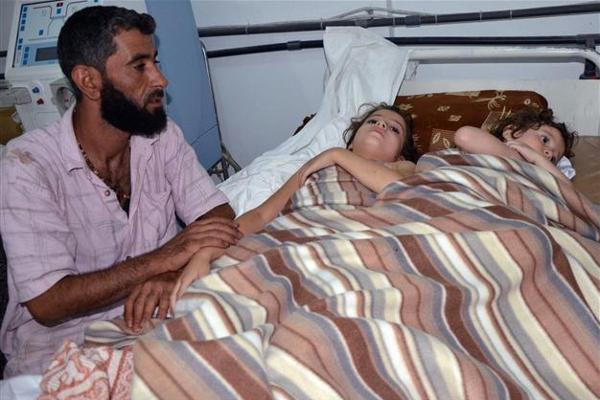All 'red lines' in Syria have been crossed: Turkish FM
ANKARA / BRUSSELS


A man sits in a hospital near two children who activists say were affected by nerve gas in the Ghouta region, in the Duma neighbourhood of Damascus August 21, 2013. REUTERS Photo
Turkish Foreign Minister Ahmet Davutoglu said on Thursday "all red lines" had been crossed in Syria and criticized international inaction after the opposition accused Syrian government forces of gassing hundreds in a chemical weapons attack."All red lines have been crossed but still the U.N. Security Council has not even been able to take a decision. This is a responsibility for the sides who still set these red lines and for all of us," Davutoglu told reporters in Berlin at a joint press conference with his German counterpart Guidio Westerwelle.
Davutoğlu also said the United Nations had lost its deterrence ability over the crimes against humanity committed in Syria, during an interview with private broadcaster Kanal 24 on August 21.
“During the meeting of the National Security Council, the number of dead had reached 1,187. We all had tears in our eyes, because we have been shown some footage found by our national intelligence service,” Davutoğlu said.
“These are images that are not tolerable by any human being. It is impossible to accept that those who are [physically and morally] blind to what’s happening in Syria stay that way after this crime against humanity,” he said.
“No one says that the chemical attack did not take place. The Syrian regime also condemns it but says that it is not responsible.”
Davutoğlu also revealed that he personally asked the General-Secretary of the United Nations Ban Ki-Moon for a Security Council meeting and the immediate clarification of the claims by a U.N. fact-finding mission set up to investigate the alleged use of chemical weapons in the Syrian conflict.
For its part, the Turkish Foreign Ministry issued a strongly-worded statement describing as “barbarity” and “atrocity” the reports on the chemical attack, stressing that the international community was facing a “moral test.”
“The International community and the United Nations are confronted with a serious test in front of human morality and history. We are inviting the UN Security Council to take its responsibility over this massacre which is a crime against humanity,” the statement said.
“Those responsible for this atrocity are the leaders of a regime that wants to keep its power regardless of any cost and a group out of its senses. This group that kills its own people will sooner or later render account on what it has done,” the statement also said.
Syria says reports 'baseless'
Reports of chemical weapons’ attack were promptly denied by the Syrian government as baseless.
“They are an attempt by to divert the U.N. commission on chemical weapons from carrying out its mission,” the state-run SANA news agency said, quoting an unnamed government official.
The Britain-based Syrian Observatory for Human Rights said the shelling was intense and hit the capital’s eastern suburbs of Zamalka, Arbeen and Ein Tarma.
It quoted activists as saying that regime forces fired “rockets with poisonous gas heads” in the attack that killed “tens of people.”
EU seeks probe, Russia calls claim 'provocation'
The European Union also condemned Aug. 21 the suspected use of chemical weapons by Syrian government forces as "totally unacceptable," demanding an immediate investigation.
EU foreign affairs head Catherine Ashton said charges by Syria's main opposition group that a chemical attack by the regime had left over 1,300 dead, "should be immediately and thoroughly investigated." A UN mission in Syria to probe previous allegations of chemical weapons use "must be allowed full and unhindered access to all sites," Ashton said, according to a spokesperson.
"The EU reiterates that any use of chemical weapons, by any side in Syria, would be totally unacceptable," she said.
The authorities and all other parties in Syria "need to provide all necessary support to and cooperation with the mission's operations.
"We have also noted invitations by the opposition for the mission to visit rebel-held areas," Ashton added.
British Foreign Secretary William Hague expressed concern at the reports, saying it "is a very important matter to pursue (and)... we are pursuing this with urgency." His German counterpart Guido Westerwelle demanded that the UN chemical weapons team in Syria should "immediately have the opportunity to verify the allegations comprehensively." The charges were "very serious and alarming," Westerwelle said.
French Foreign Minister Laurent Fabius, speaking in Brussels, said if proven the use of chemical weapons would "not only be a massacre, but also an unprecedented atrocity."
Fabius said however that the accusations from the Syrian opposition were "not yet verified." Swedish Foreign Minister Carl Bildt called on Syria to grant "urgent" access to UN investigators to determine whether the regime has used the weapons.
For its part, the Russian Foreign Ministry also called for a "fair and professional" investigation of reports of chemical attack by the Syrian government forces.
However, Moscow noted evidence suggested that the reported attack could be a "premeditated provocation."
The foreign ministry stressed that the reports were issued just as a U.N. chemical weapons inspection team had arrived in Syria and noted that "this makes us think that we are once again dealing with a premeditated provocation."
The foreign ministry said the claims were first reported "by partisan regional media all at once, as if by command" and argued that previous such reports had proven false.
Moscow has defended Syrian President Bashar al-Assad's regime throughout the conflict and only accused his opponents of using chemical arms.
The Russian ministry statement said the opposition appeared to be trying to undermine the chances of all sides agreeing to sit down for peace negotiations first mooted by Moscow and Washington in May.
